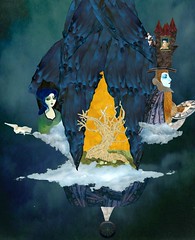
"Underneath Your Eyelids," Agnieszka Szuba
"William Stanley Merwin (born 30 September 1927 ) is an American poet. He made a name for himself as an anti-war poet during the 1960s. Later, he would evolve toward mythological themes and develop a unique prosody characterized by indirect narration and the absence of punctuation. In the 80s and 90s, Merwin's interest in Buddhist philosophy and deep ecology also influenced his writing. He continues to write prolifically, though he also dedicates significant time to the restoration of rainforests in Hawaii, where he currently resides.
Merwin has received many honors, including the Pulitzer Prize for Poetry (in both 1971 and 2009) and the Tanning Prize, one of the highest honors bestowed by the Academy of American Poets, as well as the Golden Wreath of the Struga Poetry Evenings." (wikipedia)

"Succubus," Agnieszka Szuba

"In the Chamber of Miracles and Fears," Agnieszka Szuba
Two days ago, I posted a poem of his I had stumbled across on language, which got me looking through his poetry again, which led me to making another post :)
In 1971, Merwin donated the money from his Pulitzer Prize award to the draft resistance movement, simultaneously publishing his objections to the Vietnam War in the New York Review of Books.
His poem, Ogres, which is also a form of protest against war, is a favorite of mine, as it makes me think of dream theories and the necessity of applying them to everyday life. One of the main principles to remember when studying your dreams is that every character in them is actually an aspect of you. You may dream of your husband, wife, mother, neighbor, or the bully in your school, but in your dream each of them is representing some aspect of you that has been prevalent in some internal conflict or that has been the guiding force in your actions over the previous 24-48 hours. And so the idea is not to wake up and go let that person have it for cheating or abandoning or otherwise violating you, but rather to figure out where you have been doing such a thing to yourself--what talent or interest you've been neglecting, where you've been cheating yourself.
If I could look at the waking world in that way, I would spend less time angry, and more time solving problems and drinking magic potions :) The poem Ogres hinges on that idea.

"Theatre of Things Unknown and Unseen"
Agnieszka Szuba
Here's that poem:
OGRES
-W.S. Merwin-
All night waking to the sound
of light rain falling softly
through the leaves in the quiet
valley below the window
and to Paula lying here
asleep beside me and to
the murmur beside the bed
of the dogs’ snoring like small
waves coming ashore I
am amazed at the fortune
of this moment in the whole
of the dark this unspoken
favor while it is with us
this breathing peace and then I
think of the frauds in office
at this instant devising
their massacres in my name
what part of me could they have
come from were they made of my
loathing itself and dredged from
the bitter depths of my shame
--W.S.Merwin--
And here's a playlist of some more dream-related images created by Agnieszka Szuba:













No comments:
Post a Comment